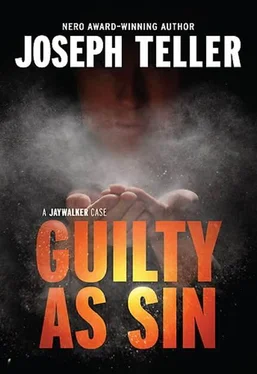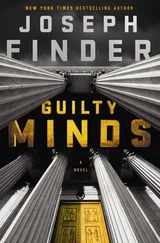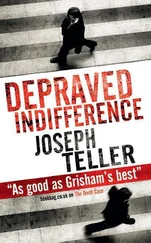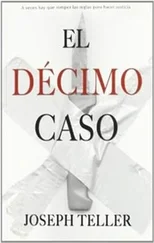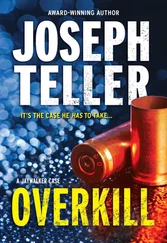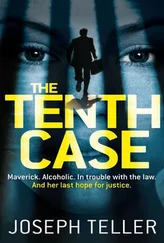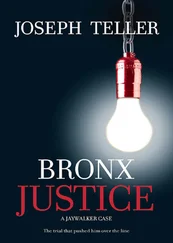Joseph Teller - Guilty As Sin
Здесь есть возможность читать онлайн «Joseph Teller - Guilty As Sin» весь текст электронной книги совершенно бесплатно (целиком полную версию без сокращений). В некоторых случаях можно слушать аудио, скачать через торрент в формате fb2 и присутствует краткое содержание. Жанр: Криминальный детектив, на английском языке. Описание произведения, (предисловие) а так же отзывы посетителей доступны на портале библиотеки ЛибКат.
- Название:Guilty As Sin
- Автор:
- Жанр:
- Год:неизвестен
- ISBN:нет данных
- Рейтинг книги:5 / 5. Голосов: 1
-
Избранное:Добавить в избранное
- Отзывы:
-
Ваша оценка:
- 100
- 1
- 2
- 3
- 4
- 5
Guilty As Sin: краткое содержание, описание и аннотация
Предлагаем к чтению аннотацию, описание, краткое содержание или предисловие (зависит от того, что написал сам автор книги «Guilty As Sin»). Если вы не нашли необходимую информацию о книге — напишите в комментариях, мы постараемся отыскать её.
Guilty As Sin — читать онлайн бесплатно полную книгу (весь текст) целиком
Ниже представлен текст книги, разбитый по страницам. Система сохранения места последней прочитанной страницы, позволяет с удобством читать онлайн бесплатно книгу «Guilty As Sin», без необходимости каждый раз заново искать на чём Вы остановились. Поставьте закладку, и сможете в любой момент перейти на страницу, на которой закончили чтение.
Интервал:
Закладка:
Pulaski stated that he was satisfied with what the judge intended to tell the jurors, and that he had no objections or additional requests.
Then it was Jaywalker’s turn.
“The defense requests that you charge the jury on both entrapment and agency,” he said.
A half an hour later, they were still arguing about both requests. Pulaski took the position that there couldn’t have been any entrapment as a matter of law. Since Clarence Hightower had been acting on his own when he approached Alonzo Barnett, it hadn’t been law enforcement that was responsible for any pressure put on Barnett, if indeed there’d been any.
Jaywalker countered by arguing that whether Hightower had been acting on his own or in cooperation with the task force was a question of fact, and like all questions of fact it was up to the jury to decide. Even as Judge Levine agreed with Pulaski that most of the evidence supported his position, she expressed her concern that her refusal to at least present the issue to the jurors for their determination might be grounds for reversal. “It’s not that I’m agreeing it was entrapment,” she explained. “After all, we have a captain and a lieutenant denying that Mr. Hightower ever worked with them. But Mr. Jaywalker does have a point. It’s up to the jury to decide. So I’ll read them the statutory language from section…section-”
“Forty point oh-five,” said Jaywalker.
“Thank you.”
Her reluctant acquiescence might not have sounded all that promising to anyone else. But it was good enough for Jaywalker. He was perfectly content to have Pulaski continue to think of entrapment as a nonstarter. All Jaywalker could ask for at this point was that the door be cracked open just enough for him to get a foot in. The rest, he knew, would be up to him.
He had an even harder time when it came to agency. As soon as he’d mentioned the word, he’d realized that neither Levine nor Pulaski had even considered it as a possible defense. The theory behind an agency defense is that although a sale occurred and the defendant took part in it, he was aligned not with the seller, but the buyer. If that was so, he could be convicted only of buying drugs, not selling them. And buying was no crime.
“Agency?” Pulaski repeated incredulously. “The defendant profited from these sales, by his own admission. He wasn’t working for Agent St. James. He was selling to him. He was working for himself. The record couldn’t be clearer. Give me a break, will you?”
Again the judge expressed skepticism that, given the facts, the defense should be available. But again she ended up siding with Jaywalker out of an abundance of caution and the fear of seeing a conviction reversed. “Personally,” she said, “I don’t think the jurors will spend five minutes on this one. But technically, Mr. Jaywalker’s right again. It’s up to them to rule it out, not me. So I’ll include something on it. Though over your objection, Mr. Jaywalker, I’ll instruct them that it’s a defense only to sale, not possession. Anything else, gentlemen?”
“That’s it for me,” said Jaywalker.
“Nothing else,” said Pulaski.
“Then I’ll see you back here first thing Monday morning, nice and refreshed.”
Right.
Over the three nights between now and then, Jaywalker would sleep for a combined total of less than ten hours, and fitfully at that.
So much for nice and refreshed.
18
Jaywalker had long been a card-carrying procrastinator, and he managed to put off working on his summation all of Friday evening and most of Saturday. But it wasn’t as if doing so allowed him to enjoy himself. He and his wife even went for a walk Saturday afternoon, something they hadn’t done together for months. But on the way back, after the third time Jaywalker had said “What?” to one of her questions, she finally told him he might as well get down to work, that until his summation was done he would be no good to her or anyone else.
“How about sex?” he suggested. “Maybe that would help.”
“Right,” she laughed. “And halfway through, you’d say, ‘Wait a minute, an idea just came to me.’ Thanks, but no thanks.”
“Afterward?”
“Afterward,” she agreed. But they both knew full well that there’d be no afterward until he’d actually given the damn thing. He’d work on it on and off until then, mostly on. He’d work on it that night, all day Sunday and long into Sunday night. He’d still be working on it Monday morning, right up until the moment the judge looked his way and said, “Mr. Jaywalker?” And that was on top of the fact that he’d been working on it for two months now, ever since the first time he’d sat down with Alonzo Barnett and learned about the favor Barnett had done for Clarence Hightower.
He began with the Penal Law, as he often did.
§ 40.05 Entrapment
In any prosecution for an offense, it is an affirmative defense that the defendant engaged in the proscribed conduct because he was induced or encouraged to do so by a public servant, or by a person acting in cooperation with a public servant, seeking to obtain evidence against him for the purpose of criminal prosecution, and when the methods used to obtain such evidence were such as to create a substantial risk that the offense would be committed by a person not otherwise disposed to commit it. Inducement or encouragement to commit an offense means active inducement or encouragement. Conduct merely affording a person an opportunity to commit an offense does not constitute entrapment.
It was by no means the first time he’d read the section, of course. He’d done so as recently as Thursday night, which explained why he’d used the words induced and encouraged during his rebuttal questioning of Alonzo Barnett, and why a moment later he’d asked Barnett if he would have obtained heroin for Trevor St. James but for the pressure Hightower had exerted on him. No, Barnett had said, never.
At the time, Daniel Pulaski had made a show of waving off Barnett’s answers as too self-serving to be worthy of cross-examination. Pulaski might have been better off had he spent a little less time practicing his gestures and paying more attention to reading section 40.05.
Now, as Jaywalker reread the language of the statute for the twentieth time, he was reminded that it contained plenty of bad news, too. For starters, it classified entrapment not as a “defense” but an “affirmative defense.” That distinction might have seemed a minor one to some, a matter of mere semantics. But if you went back to section 25.00 the difference became clear, and its implications were nothing short of game-changing. In the case of a “defense”-such as insanity or justification-the prosecution bore not only the burden of disproving the claim, but of doing so beyond a reasonable doubt. But when it came to an “affirmative defense,” the burden of proof became the defendant’s. And although the standard of proof that had to be met was a lesser one, satisfied by a “preponderance of the evidence,” that was still nothing to sneeze at.
Next came the requirement that the defendant committed the offense because he was induced or encouraged to do so. That, Jaywalker figured, was the easy part. If the jurors decided to credit Alonzo Barnett’s testimony-and Jaywalker was pretty sure they would-then they shouldn’t have too much trouble concluding that Clarence Hightower’s conduct had risen to the level of inducement or encouragement. Hell, it had gone miles past that.
It was the next phrase that was going to be the tricky part, the requirement that the inducement or encouragement be done by a public servant or by someone cooperating with a public servant. That was where this case was going to be won or lost, Jaywalker knew. That was the threshold issue of the trial, the moat that he and his client had to cross before they could storm the castle and do battle. And on that issue, as well as all others pertaining to entrapment, the defense once again bore the burden of proof.
Читать дальшеИнтервал:
Закладка:
Похожие книги на «Guilty As Sin»
Представляем Вашему вниманию похожие книги на «Guilty As Sin» списком для выбора. Мы отобрали схожую по названию и смыслу литературу в надежде предоставить читателям больше вариантов отыскать новые, интересные, ещё непрочитанные произведения.
Обсуждение, отзывы о книге «Guilty As Sin» и просто собственные мнения читателей. Оставьте ваши комментарии, напишите, что Вы думаете о произведении, его смысле или главных героях. Укажите что конкретно понравилось, а что нет, и почему Вы так считаете.
